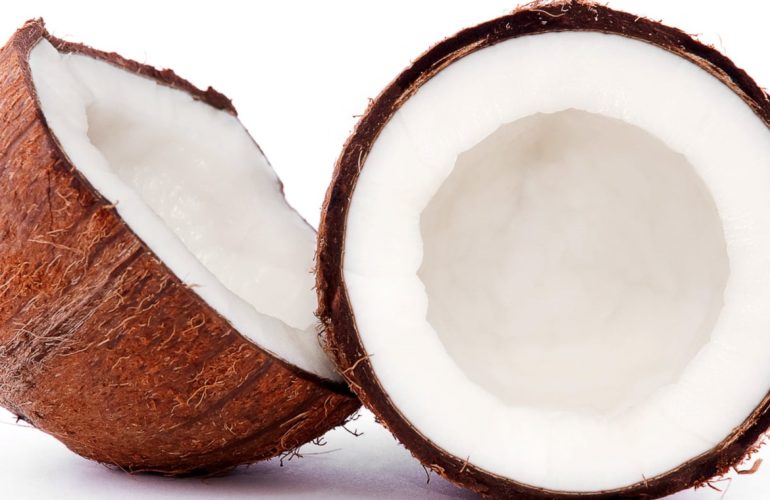Coconut or “Nariyal” is considered as a good luck charm for new beginnings.
It is full of nutrients like calcium, magnesium, sodium, potassium, vitamin C, etc, and also exhibit some amazing health benefits, but today’s concern is:
“Why You Should Include Coconut in Diet? Eat Coconut for Fat loss?”
Before answering the question, let’s gain some knowledge about “COCONUT”.
TYPES AND STAGES
In Ayurveda, the use of Coconut is divided according to its stage or age or levels of maturity:
1. Tender Coconut / Baal / Baby Coconut:
- It is a Pitta dosha-pacifier.
- It has Sita (cold) effect on the body.
- It has almost 90% water.
- Coconut water is high in electrolyte content.
- It helps manage thirst, fever, infection, boost immunity.
- Drink it to stay energetic, and improve endurance.
2. Half-mature Coconut / middle aged or Madhyam:
- In this stage, Coconut contains less water than the tender ones.
- It is lighter on the metabolic system.
- It has a soft pulp.
- The water is slightly milky at this stage of coconut.
- It’s also good for everyone.
- But Kapha dominated people should avoid having it at night.
- It’s cooling but little heavy at the same time which may causes problems.
3. Fully matured or Pakva Coconut:
- When a Coconut becomes mature, it becomes heavy to digest
- It can also aggravate Pitta or Vata Dosha.
- This type of Coconut has firm ‘meat’ or pulp.
- The coconut we use for Chutney or making Ladoo.
- We can make coconut milk or cream from it.
- If fully matured Coconut is consumed in large quantities, a person might experience hyperacidity.
4. Dried Coconut/ Sukha
- This coconut has longer shelf life, and is used for making flakes, Ladoo, coconut flour.
MULTIPLE USES OF COCONUT
- Coconut water.
- Coconut milk.
- Coconut cream.
- Coconut yogurt.
- Coconut oil: (virgin and refined):
- Virgin coconut oil made from fresh coconut, milk (It has more aroma, taste and MCT {Medium chain triglycerides}).
- Regular oil made from dried and processed, de colorized, bleached (It has different aroma, and intense taste), (may not be liked by everyone & may have trans-fat).
- Coconut flakes, powder, flour.
- Coconut meat.
- Coconut sugar.
Nutritional Facts for 100 grams / 100 ml of various types of Coconut
Lightest form of coconut which is easy to digest:
- Coconut water 100 ml – 22 calories (1 coconut= 40-50 calories); no protein or fat.
- Coconut Milk 100ml – 80-250 calories (Homemade / Store bought) some protein & lots of fat.
| Raw coconut meat | Dried coconut meat | Coconut oil | |
| Calories | 354 | 650 | 791 |
| Protein | 3 gm | 7.5 gm | |
| Carbs | 15 gm | 25 gm | |
| Fat | 33 gm | 65 gm | |
| Manganese | 75% of the DV (Daily value) | 137% of DV | |
| Copper | 22% of DV | 40% of DV | |
| Selenium | 14% of DV | 26% of DV | |
| Magnesium | 8% of DV | 23% of DV | |
| Phosphorus | 11% of DV | 21% of DV | |
| Iron | 13% of DV | 18% of DV | |
| Potassium | 10% of DV | 16% of DV | |
| Fiber | 33 gm | 65 gm | 87 gm |
NUTRITIONAL BENEFITS
Even though smaller in proportion, the folate, vitamin C, and thiamine present in raw coconut can really add to your health over time when consumed regularly.
Much of the fat in coconut is in the form of medium-chain triglycerides (MCTs).
- Your body metabolizes MCTs differently than other types of fats.
- MCT is absorbed directly from your small intestine and rapidly uses them for energy.
- One research on the benefits of MCTs in people with obesity found these fats may promote body fat loss when eaten in place of long-chain saturated Fats from animal foods like ghee, butter etc.
Antioxidants in Coconut.
Coconut meat contains phenolic compounds, which are antioxidants that may help protect cells from oxidative damage. The main phenolic compounds identified include:
- gallic acid
- caffeic acid
- salicylic acid
- p-coumaric acid
BENEFITS OF COCONUT
- It helps in lowering the cholesterol levels.
- It helps in reducing belly fat.
- Blood sugar. Coconut is low in carbs and rich in amino acids, healthy fats, and fiber, making it a great choice for blood sugar control.
- Raw coconut is high in fiber, and thus prevents constipation.
- Coconut water bolsters the immunity.
- Enhances skin. According to Ayurveda, applying Coconut oil on to the skin helps in wound healing and manages scars, blemishes, eczema, psoriasis etc. due to its Snigdha (oily) and Ropan (healing) properties.
- Coconut is considered good for bones.
- Boosts endurance. Medium chain triglycerides (MCTs) present in coconut, have been demonstrated to boost the endurance of trained athletes.
- Improves and aids the digestive health.
- Good for hair growth.
CONTROVERSY
American Heart Association published a report saying coconut oil is dangerous.
REASON:
It’s high in saturated fat and can cause heart attack.
Facts Ignored by them:
- 70% MCT: it’s directly absorbed in small intestine, by pass gall bladders & liver.
- 50% of coconut oil is Lauric acid (which shows antimicrobial properties) & bolsters the immunity.
- Coconut oil actually lowers bad cholesterol.
SIDE EFFECTS
- Undoubtedly Coconut is in fat, if consumed in excess leads to weight gain
- Excess consumption may lead to indigestion.
- People with kidney issue should avoid over consumption of coconut water.
- Coconut can cause allergies to people.
- Consumption of coconut in excess can cause electrolytes imbalance.
- Try to consume it fresh, stale coconuts can have side effects.
- Excess consumption may cause inflammation.
